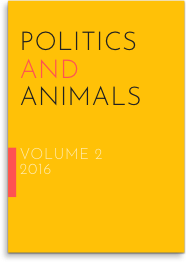Abstract
In this article, we reinterpret the current political turn in animal rights theory in terms of republican as opposed to liberal political theory. By appealing to the values of liberty and fraternity as well as equality, we argue for a conception of animal liberation from human domination and not from humanity per se. This establishes a basis of liberty and fraternity in our cooperative relationships with animals in a "zoopolis," or interspecies political community. We contend that such a basis for interspecies political cooperation is not available on the more traditional model of animal liberation, where rights are derived from weak equality of the species.
References
- Abbey, R. (2007). Rawlsian resources for animal ethics. Ethics and the Environment, 12(1): 1-22.
- Blunt, G.D. (2015). On the source, site and modes of domination. Journal of Political Power, 8(1): 5-20.
- Bohman, J. (2007). Democracy across borders: From demos to demoi. Cambridge, MA: MIT Press.
- Burgess-Jackson, K. (1998). Doing right by our animal companions. The Journal of Ethics, 2: 159-185.
- Clement, G. (2003). The ethic of care and the problem of wild animals. Between the Species, 13(3): 9-21.
- Cochrane, A. (2013). Cosmozoopolis: The case against group-differentiated animal rights. Law, Ethics and Philosophy, 1: 127-141.
- Coeckelbergh, M. (2009). Distributive justice and co-operation in a world of humans and non-humans: A contractarian argument for drawing non-humans into the sphere of justice. Res Publica, 15(1): 67-84.
- Cohen, A.I. (2007). Contractarianism, other-regarding attitudes, and the moral standing of nonhuman animals. Journal of Applied Philosophy, 15(2): 188-201.
- Donaldson, S., & Kymlicka, W. (2011). Zoopolis: A political theory of animal rights. Oxford: Oxford University Press.
- Donovan, J. (1996). Attention to suffering: A feminist caring ethic for the treatment of animals. Journal of Social Philosophy 27(1): 81-102.
- Dunayer, J. (2004). Speciesism. Derwood, MD: Ryce Publishing.
- Fjellstrom, R. (2002). Specifying speciesism. Environmental Values, 11(1): 63-74.
- Francione, G. (1996). Rain without thunder: The ideology of the animal rights movement. Philadelphia, P.A.: Temple University Press.
- Francione, G. (2008). Animals as persons: Essays on the abolition of animal exploitation. New York: Columbia University Press.
- Garner, R. (2012a). Much ado about nothing?: Barry, justice and animals. Critical Review of International Social and Political Philosophy, 15(3): 363-376.
- Garner, R. (2012b). Rawls, animals and justice: New literature, same response. Res Publica, 18(2): 159-172.
- Garner, R. (2013). A theory of justice for animals: Animal rights in a nonideal world. Oxford: Oxford University Press.
- Hailwood, S. (2012). Bewildering Nussbaum: Capability justice and predation. Journal of Political Philosophy, 20(3): 293-313.
- Henderson, K. (2009). Relational approaches to animal ethics and the intuition of differential obligations (Master's thesis, University of Victoria, Victoria, BC, Canada). Retrieved from http://hdl.handle.net/1828/3963.
- Hinchcliffe, C. (2015). Animals and the limits of citizenship: Zoopolis and the concept of citizenship. Journal of Political Philosophy, 23(3): 302-320.
- Hobson, K. (2007). Political animals? On animals as subjects in an enlarged political geography. Political Geography, 26(3): 250-267.
- Horta, O. (2013). Zoopolis, intervention, and the state of nature. Law, Ethics and Philosophy, 1: 113-125.
- Ladwig, B. (2015). Against wild animal sovereignty: An interest-based critique of Zoopolis. Journal of Political Philosophy, 23(3): 282-301.
- List, C. (2006). Republican freedom and the rule of law. Politics, Philosophy & Economics, 5(2): 201-220.
- Lovett, F. (2010). A general theory of domination and justice. Oxford: Oxford University Press.
- Maynor, J. (2003). Republicanism in the modern world. Cambridge: Polity Press.
- Midgley, M. (1983). Animals and why they matter. Athens: University of Georgia Press.
- Milligan, T. (2015). The political turn in animal rights. Politics and Animals, 1(1): 6-15.
- Palmer, C. (2010). Animal ethics in context. New York: Columbia University Press.
- Pettit, P. (1999). A theory of freedom and government. Oxford: Oxford University Press.
- Rawls, J. (1999). A theory of justice: Revised edition. Oxford: Oxford University Press.
- Regan, T. (1983). The case for animal rights. Berkeley, CA: University of California Press.
- Regan, T. (1987). The struggle for animal rights. Clarks Summit, PA: International Society for Animal Rights.
- Richardson, H.S. (2002). Democratic autonomy: Public reasoning about the ends of policy. Oxford: Oxford University Press.
- Rogers, T. (2012). Sue Donaldson and Will Kymlicka. Zoopolis: A political theory of animal rights. Journal of Value Inquiry, 46(4): 503-510.
- Rowlands, M. (1997). Contractarianism and animal rights. Journal of Applied Philosophy, 14(3): 235-247.
- Scruton, R. (2000). Animal rights and wrongs. London: Claridge Press.
- Silverstein, H. (2013). Citizen ruff: Do humans have political obligations to animals? Tulsa Law Review, 49(2): 541-556.
- Singer, P. (1975). Animal liberation. New York: HarperCollins.
- Smith, K. (2012). Governing animals: Animal welfare and the liberal state. Oxford: Oxford University Press.
- Wissenburg, M. L. J. (2014). An agenda for political animal theory. In M.L.J. Wissenburg & D. Schlosberg (Eds.), Political Animals and Animal Politics (pp. 30-43). New York: Columbia University Press.
- von Essen, E., & Allen, M. (2016a). A rabble in the zoopolis? Considering responsibilities for wildlife hybrids. Journal of Political Philosophy, 47(2): 171-187.
- von Essen, E., & Allen, M. (2016b). The republican zoopolis: Towards a new legitimation framework for relational animal ethics . Ethics and the Environment, 21(1): 61-88.
- von Essen, E., & Allen, M. (in press). Solidarity between human and non-human animals: Representing animal voices in policy deliberations. Environmental Communication
- Wong, S.I. (2010). Duties of justice to citizens with cognitive disabilities. In E. F. Kittay & L. Carlson (Eds.), Cognitive Disability and Its Challenge to Moral Philosophy (pp. 127-146). Malden, MA: Wiley-Blackwell.

